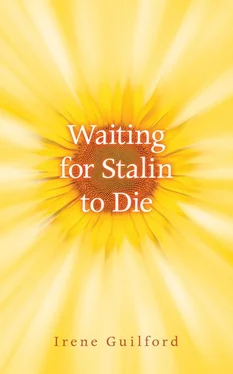It was Brunius, not Alex, who had descended from the train. Coming towards her on the crowded station platform in Vilnius, taking her hand, he had given her the news. She had slumped against him. And there she had remained. After a short, respectful courtship, they had married, united by a battlefield promise made to a dying comrade.
Brunius, twenty years her senior, was an old soldier, tall, spare and reserved. Seeing her holding her new-born son, her face blazing with love, he knew he would never come first for mother or child. What life gives, he thought, it can just as easily take away. And knowing himself to be honoured and respected, he was abashed at the treasures life had swept up on his shores.
They lived in harmony, the child a goodness arising from crushed lives. Advancing their son’s happiness became their chief joy. Vytas entered medical school. He became engaged to Lidia, daughter of old friends. And anticipating graduation, a wedding and grandchildren, their hearts were full.
Then war came. Sitting around a Sunday luncheon table, hearing the guns of the advancing Russian front, they spoke in hushed tones. We must leave, they said. Whatever happens will happen to all of us. And looking into one another’s eyes, they saw feelings impossible to express.
The two families had reached Berlin. Fighting through crowds on the station platform, clambering aboard a westbound train, they had secured seats. The train would take them further from danger. It would leave in four hours. And rejoicing at having come this far without misfortune, they settled in to wait.
It was then that Lidia’s mother had lifted her hand to her throat with a small cry. The little cross which she had received as a little girl from a mother now dead, a gold cross which could be bartered for food, was gone. It must have come off while they slept. It must be among the pillows. They must go back and look.
Hurry, Juze had said to Lidia’s parents. We will wait for you. We will save your seats.
I’ll be back soon, Lidia had whispered against Vytas’ ear.
Vytas had watched through every minute of every hour, his teeth clenched, his eyes straining for his love’s return. When the train had lurched into motion, he had leapt up. Lidia! Lidia! he had cried. And trying to climb out the window, clambering after his escaping words, he felt his mother grip the back of his shirt.
No! she had cried, pulling him back with a ferocity he had never known. No. You mustn’t. They will catch up with us. They will find us. Come away from the window, my son. Come away.
He had let himself be turned back into the gloom of the compartment. Resting his forehead against the cold window, staring into the black night, he had heard the rhythmic clacking of the wheels. Lidia Lidia Lidia, they had said. And carried through a darkened countryside he could no longer see, he travelled towards safety and away from love.
Much later in Canada, they would learn that Lidia and her parents had walked into the arms of the enemy which had just entered Berlin. They would have been shipped back the way they had come. They would have been sent to Siberia, put in prison or been shot. They were never seen or heard from again.
The guilt never left Vytas. He lived in a dark tunnel leading back to Siberia, prison or death. He should not have let her go. He should have gone with her. He should have gone after her when she did not return. He should be with her, there, in the dark heart of the earth. Light and life lay before him, but forgiveness was out of reach.
Vytas descended from the College streetcar, stepping into the fine city morning. Standing on the sidewalk in the clear spring air, he looked across the street. A pale dirt path led to the university. It cut between old buildings of rough grey stone. And imagining his arrival in front of the medical building, his heart stirred at the prospect of a life resumed.
Men moved past him with ease in early morning. Walking with purpose, intent on business, they acknowledged ladies with the quick lift of a hat. They would stop to shake a man’s hand. They would grip his upper arm. And continuing on their way, they passed unawares through the invisible tethers around Vytas, soft translucent ribbons tying him to a country they didn’t know.
His mother was waiting in the flat on Glenlake Avenue. Standing by the second-floor window, looking down into the street, she would watch for him to round the corner. He would turn away from the commotion of Dundas Street and the railway tracks. He would enter the peaceful eddy of the quiet, treed street. And watching him come into view, she waited for him to reach home.
Home? Lithuania was home. Canada was safety and freedom, struggle and hope, disappointment and hard work and the occasional helping hand which, just because it was needed, stung the pride. It was no longer running and hiding as it had been during the war, or limbo as it had been in the DP camps. It was not death or imprisonment or Siberia, as it was for those who had not left soon enough, or run far enough, or stayed behind. It was life by grit and good luck, a life for which they were grateful.
The streetcar clanged at a young woman crossing in front. Jumping at the loud sudden peal, she hurried past in her swirling skirt and white high-heeled shoes. She cast a good-natured smile at the driver. She gave him a friendly wave. And in her light-hearted movements and manner, Vytas saw his Lidia.
He hesitated to cross the street. It felt like betrayal to step from darkness into light.
Gentle hands nudged his back, the soft unseen hands of ghosts. In the pearly morning light, a voice whispered. Go, she said. Go. And feeling a soft push, he stepped off the curb.
Chapter 2

Ona stood in the doorway of the second-floor bedroom, watching Juze sorting clothes on the bed. Hoping for a chat with the doctor’s mother, she hovered. In Lithuania they would never have met. In Canada, Juze was a tenant in her house. And watching her lifting and examining Vytas’ shirt, Ona thought what a good catch the son would be for her daughter.
“Juze, what’s your boy’s favourite dish?”
“You’re such a fine cook, Šeimininke. It’s a pleasure to eat your food. Please don’t put yourself out for Vytas. He’s too busy studying to notice what he eats.”
Šeimininkė. Landlady.
If Ona had encountered Juze in the village, she would have stepped down into the street. Farmer’s wife, she would have allowed the doctor’s mother to pass. She would have waited, head lowered. She might have received an acknowledging nod. And standing in the bedroom doorway of her house in a new country, watching the woman’s disregard as she folded her son’s clothes, Ona knew that the old ways still held.
The house was on Glenlake, five doors away from Dundas and the CN/CP railway lines running alongside. Rounding the corner, she could walk to the IGA for butter and eggs, to the Towers beyond Bloor for plastic flowers, to the Village Deli at the top of Roncesvalles for unsmoked ham. She could stop at Margis Pharmacy for a chat. Mr. Margis was Lithuanian. And crossing the threshold of his shop, passing through a doorway set on an angle, she could step into the fields of home.
Ona and Jonas had bought the house within one year of arrival, receiving help from a senas imigrantas , an immigrant from the 1930’s. Providing the down payment of five hundred dollars, the rotund middle-aged bachelor might have harboured hopes of marrying the fresh young daughter. Danguole would not have it. The suitor had slipped away. And paying the loan from Jonas’ factory wages, faithfully month by month, they honoured an arrangement made, and kept, on trust.
Читать дальше













